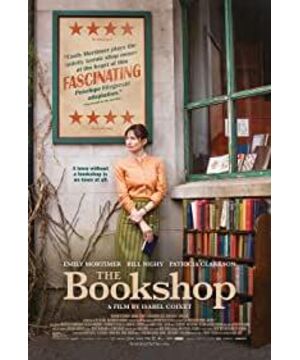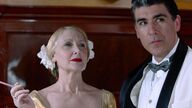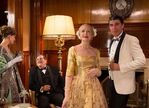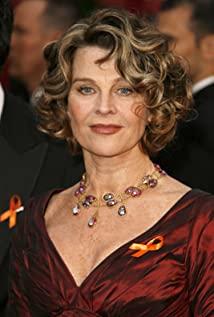Hardborg is a town built on an island between the ocean and a river. In Christine Gipping's memories, the town seems to be afraid of the cold and wet sea breeze, and always guards itself. Even in 1959 (Christine was still in elementary school), it seemed that the only communication in the town with the outside world was Mr. Raven's boat. There was no fish and chip shop, laundromat, cinema, bookstore in the town... Only the general and the Canadian Mrs. Matt's weekend banquet like a castle in the sky naturally does not belong to the public, nor does it belong to the spiritual world. At that time, no one thought that the spiritual world was a necessity, that books were a necessity, and of course no one thought that Mrs. Green would open a bookstore.
When Christine recalled Mrs. Florence Greene, she couldn't help but think of the words she said, "When we read a story, we are in it. The cover of the book is like a roof and four walls, a home "The moment you finish reading a book, those stories will continue to accompany you like the most real dreams." And Mrs Green likes to go a long way to help her organize her thoughts and feelings about reading. So it all started on that day, the day Mrs Green suddenly decided to open a bookstore in the town of Hardburgh after years of confused years of reading, walking and widowhood.
"Mr. Potato", a bank manager who would fall asleep after reading three pages, certainly couldn't understand the meaning or value of a bookstore. In fact, not only Mr. Potatoes, but almost everyone thinks it's audacious to open a bookstore in this small town, where only the gloomy Mr. Browntish likes to read. Obviously, applying for a loan from a bank has not been smooth. But when she walked out of the bank, Florence Green felt angry and impatient, but also proud and excited. She still held on to her dream and no one could stop her.
I don’t know if it was Florence Green’s plan to transform the old house into a bookstore, which stimulated the nerves of Mrs. Violet Garmat, who was still living in a noble dream. The grass in the old house had grown 500%. Years, but suddenly, Mrs. Violet Garmatt wanted to step in and convert the old house into the New Harburg Music and Arts Centre. She explained that the old house was some kind of sign or proof of a bygone era, making it a pity that it was reduced to a store.
But in fact, it was just that Mrs. Violet Garmat was used to the focus of people's attention, and she was unwilling to let the new style of running an old house fall by the wayside. But for Florence Green, the old house was a deal that took six months to negotiate, and it was impossible to hand over the management rights. This annoyed Mrs. Garmat, and the consequence was the successive obstructions imposed by the powerful forces: Mr. Deben, who wanted to auction the fish shop, suddenly visited, and the lawyer suspended the bookstore business procedures...
When Mrs Green opened the first box of books she had ordered, the manager's obstacles and difficulties of the previous day vanished. As the books were put on the shelves one by one, Mrs. Garmat, the banker, the lawyer...their faces and words gradually faded. Mrs Green proved her determination with her actions (and of course thanks to Mr Raven and the children he sent for extra-curricular carpentry practice). When the sign of the old house bookstore was hung up, Mrs. Green felt that her dead husband was back, and that was her happiest moment in the bookstore.
Then Mrs. Green welcomed her first special customer, Mr. Edmund Blountich, who had been alone in his Holt estate since his wife, who had been picking mulberries and making cakes for him, drowned in the swamp. An old gentleman who cuts off contact with outsiders. In fact, Mr. Browntich asked the boy Vari to bring a letter. In the letter, Mr. Browntich first expressed his respect for Mrs. Green's courage in opening a store, since no one in the town had run a bookstore since the high-street bookstore in his great-grandfather's time; and then agreed with Mrs. Green" Entrust Warri to deliver books and book money" method of purchasing books.
The enthusiastic shopkeeper seems to have to be matched with a capable and indifferent assistant. Mr. Raven had advised the girls of the Jiping family. But Mrs Green did not expect that it was the youngest girl, Christine Gipping, who came to report. "Why not your eldest sister?" "She is busy in love." "What about your second sister?" "She has to take care of my two younger brothers." "I help after school every day, and the money you pay me a week can't be Less than 12.5 shillings." In this way, the smart and calm little Christine occupied the assistant position with an absolute advantage.
The Fahrenheit 451 that Mrs. Greene had recommended to Mr. Bluntich was apparently approved, and Mr. Bluntich had followed up with other books by Ray Bradbury, and Mrs. Greene had sent him The Chronicles of Mars. And Mr. Browntich's feedback seems to be a signal: the old house bookstore is booming. The townspeople probably didn't expect to have an unexpected obsession with books or knowledge in some unexpected field. Mrs. Green was busy from morning till night, and temporarily forgot her plan with Mrs. Garmat to turn the old house into an art center.
It was not until Mrs. Garmat's seat that Mr. Binos stepped into the old house bookstore, and what came with him was a gift that troubled Mrs. Green. Of course, it was not a reminder that Mrs. Garmatt was still eyeing, but a book. The controversial Lolita. Mrs Green contacted and read it overnight, but was hesitant to sell it in the store. She sent Lolita along with a letter asking for feedback and comments, adding, "If you don't like the book, you don't have to pay for the book."
Christine Gippin reminded Mrs Green to watch out for North, "He laughs like a stoat, I wish he went to hell. He's too bad and you're too kind. When I grow up, I'll try to be like him Same, it's very practical." Mrs. Green smiled and did not take Christine Gippin's topic, but recommended Christine Gippin to read "Hurricane in Jamaica", let her read it, and promised to read it. Christine Gippin rewards her reading with her favorite Chinese lacquer plate.
Mrs. Gipping appeared unexpectedly in the bookstore, and she brought Mrs. Greentish's invitation to Mr. Browntish. This is the first time in many years that Hult Manor has opened its doors to outsiders. At Holt Manor, Mr Browntich revealed to Mrs Green the truth about his peaceful divorce from his wife 45 years ago. The "dead widower in the manor" was a complete rumour, and it was Mrs Garmatt who was behind it. Mr. Bluntich also reminded Mrs. Green to be careful of Mrs. Garmatt's unsuccessful attempt to retaliate by occupying the old house.
Mrs. Green, on the other hand, was more concerned with Mr. Browntich's perception of Lolita. "Running a bookstore means a certain kind of responsibility." "They may not understand the book, but it's better that understanding makes the mind lazy." This pleasant afternoon tea made them reach a kind of tacit understanding, not Because of their mutual adversary, Mrs. Garmatt, but because of mutual appreciation, Mr. Browntich respects Mrs. Greene's courage to defy the powerful, and Mrs. Greene respects Mr. Browntish's unique perspective on literature. A year-end friendship slowly sprouted.
Mrs. Green got 250 copies of "Lolita," a move Christine Gipping thought was insane. As soon as the poster was posted, residents of the town came to buy it. When this followed, a letter from Tom Thornton, the consultant lawyer for the Old House Bookstore, stated that he had received a letter from the legal representative of Mrs. Violet Garmatt, John Julie, at Stead Manor, as a police officer. The official Mrs. Garmat proposed to stop the sale of the controversial "Lolita" in order to eliminate the public security risks. Mrs Green wrote back criticising lawyer Tom Thornton for irresponsible malfeasance and dismissed Mrs Garmatt's complaint with evidence.
Unbeknownst to Mrs Green, Mrs Garmat's more vicious tactics followed. First, he accused the old house bookstore of employing child labor during school hours, and deprived Christine Jipping of the position of assistant; then he instructed North to take advantage of Mrs. Green's kindness to obtain the position of assistant of the old house bookstore, in order to prove the existence of hidden dangers in the old house. Perjury In the end, Mrs. Garmat took advantage of her nephew's official position to facilitate the passage of the law on the use of public places of value, reclaimed the old house, expelled Mrs. Green, and deprived Mrs. Green of all her property on the grounds that the old house was uninhabitable and in danger of collapsing. compensation.
Mrs. Green sadly moved out of the old house bookstore and left the town of Hardburgh. Looking back at the town from the bow of the boat, she was saddened by too many betrayals and betrayals, and what made her even more sad was the unfortunate death of Mr. Edmund Brantich, who had been in hiding for many years, in order to help her achieve justice and denounce the injustice of the world. . Mrs. Green couldn't help but wondered whether this town, which originally had no bookstore, really didn't need a bookstore. Suddenly, "Mrs. Green" broke her thoughts. On the shore was Christine Gipping. She was holding the copy of "Hurricane in Jamaica" in her arms. Thick smoke.
Years later, Christine Gipping recalled Mrs. Green in her bookstore, "She lived her dreams and was taken away, but no one could take away what she had in the depths of her heart. She bequeathed to Mine, in addition to the Chinese lacquer tray, also has the courage and love for books. She is right, people are not alone in the bookstore."
View more about The Bookshop reviews











